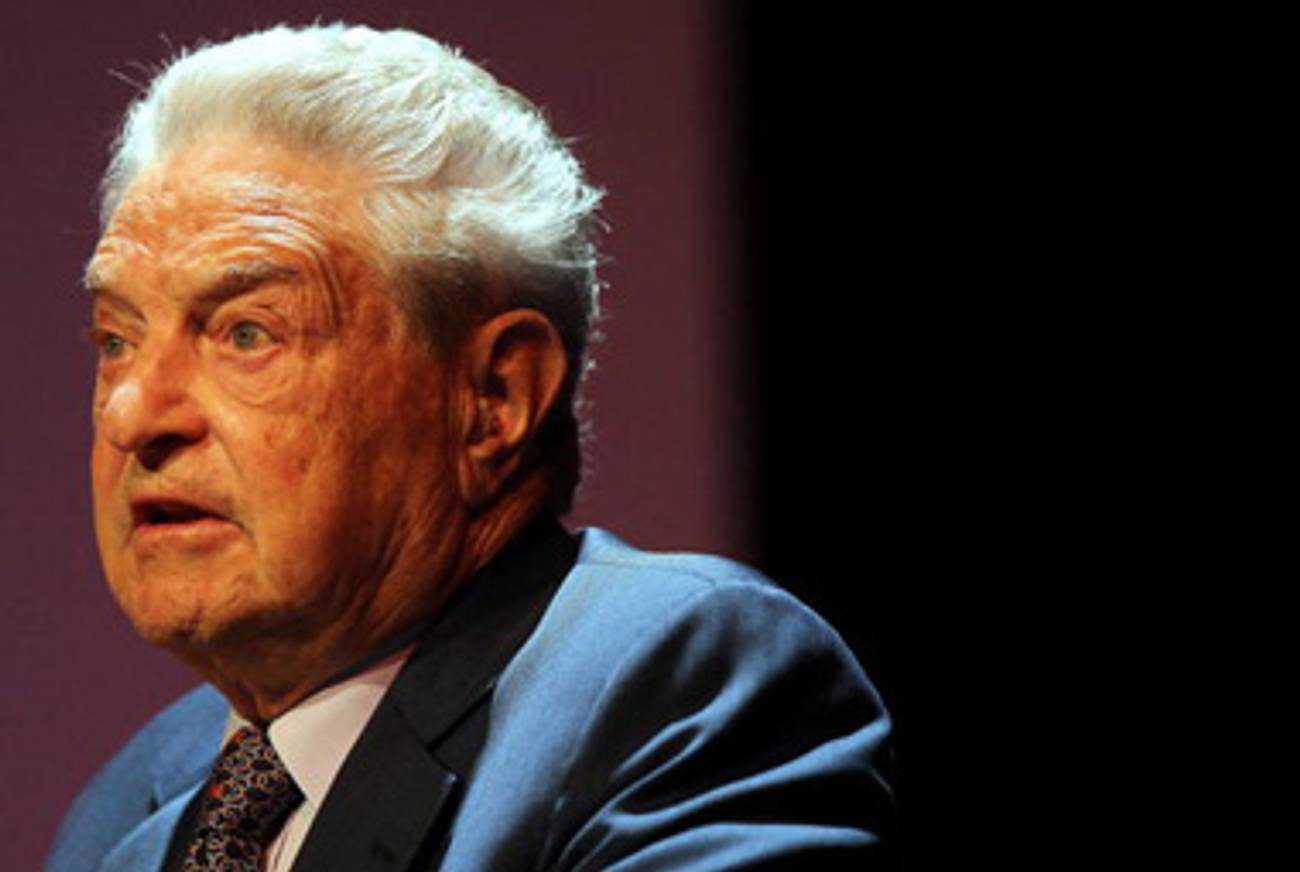Soros Funding of J Street Revealed
Group had implied otherwise




It’s an inside baseball story—but it’s in our league. For the year between July 2008 and July 2009, the “pro-Israel, pro-peace” organization received roughly one-third of its revenue—some $245,000—from billionaire Jewish left-wing financier George Soros and family as part of a three-year, $750,000 gift. The news is relevant less because Soros, a prominent AIPAC critic, is controversial—he is controversial mainly to those who are not J Street fans anyway—and more because J Street head Jeremy Ben-Ami had repeatedly implied that Soros was not a donor. As Ben Smith notes, “The apparent cover-up is perhaps worse than the crime.”
Having Soros as a donor isn’t ideal politically—whether it should or shouldn’t be, it isn’t—and J Street has been notable for wanting to be an effective political actor, not just an emotionally satisfying outlet. “Our No. 1 agenda item is to do whatever we can in Congress to act as the president’s blocking back,” Ben-Ami told the New York Times Magazine. Taking Soros’s money, by itself, is manageable politically; appearing as though it was trying to hide it is a larger problem. (For one thing, I suspect this blocking back is about to be benched until at least after the midterms.) The point is, this screw-up should upset no one as much as J Street’s supporters.
Here is Ben-Ami’s explanation, which he offered only yesterday:
I accept responsibility personally for being less than clear about Mr. Soros’ support once he did become a donor. I said Mr. Soros did not help launch J Street or provide its initial funding, and that is true. I also said we would be happy to take his support. But I did not go the extra step to add that he did in fact start providing support in the fall of 2008, six months after our launch.
J Street’s commitment to Israel ought to be judged solely on its positions and actions. But it won’t be, and Jeremy Ben-Ami knows it won’t be, which strongly suggests that he made a conscious decision to hide the Soros connection. (In 2007, Soros wrote in the New York Review of Books, “AIPAC under its current leadership has clearly exceeded its mission, and far from guaranteeing Israel’s existence, has endangered it.”) Additionally, on its Website, J Street asked to be judged as an organization that had not taken Soros’s money (here is the essential reading).
Which leads to the real point: The group indisputably just lost a lot of credibility. Fair or not, fallacial critiques or not, when someone as high-profile and controversial as Soros gives you money—and when you accept it—you need to voluntarily disclose this, even if no one asks you about it. Moroever, given that people apparently did ask about it, only to be basically dismissed, why should we continue to believe J Street’s leadership about, well, anything? (Incidentally, reporter Eli Lake was able to access the relevant documents, which should have been private, due to an IRS error. But if J Street thought this would never come out, then which political/media system did it think it was operating in?)
Finally, Soros has a history of using his (substantial) political philanthrophy to advance his own agenda. Which does not prove that J Street went along with him in this instance; but it does add to the need for there to have been disclosure.
James Besser strikes the right note (while reminding us that there are several elections in November):
Why this is stupid: there’s no way this information wasn’t going to come out.
There’s no way this revelation, coming after two years of denials, will not be seen as confirmation in the minds of many that J Street is what its detractors say—a group that is something less than pro-Israel. The critics, it turns out, were right about Soros; isn’t that going to fan suspicion they were right about other things, as well?
There’s no way this isn’t going to make the politicians supported by J Street and those who may be considering accepting its endorsement incredibly nervous. Instead of providing protection for the politicians they supported, J Street essentially hung them out to dry—not by accepting Soros money, but by lying about their connection to the controversial philanthropist.
And there’s no way this doesn’t sow mistrust among commentators and reporters who write and speak about J Street, and who were repeatedly misled by its officials. J Street sought to create a climate of trust with a press corps that was being spun heavily by its opponents; this news undoes a lot of that effort.
Soros Revealed as Funder of of Liberal Jewish-American Lobby [Washington Times]
Explanation of George Soros & J Street Funding [J Street]
J Street in a Tough Spot Over Soros Funding Revelations [Political Insider]
J Street’s Half-Truths and Non-Truths About Its Funding [Atlantic]
Related: On Israel, America, and AIPAC [NYRB]
Marc Tracy is a staff writer at The New Republic, and was previously a staff writer at Tablet. He tweets @marcatracy.